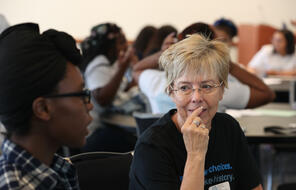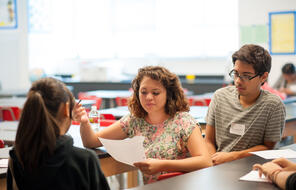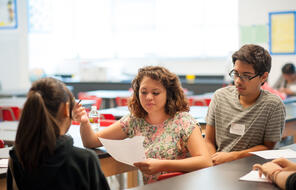Guide
Speaker Visit Checklist
This checklist provides guidance for thoughtfully hosting a witness-to-history guest speaker in your classroom.
At a Glance
Language
English — USSubject
- English & Language Arts
- History
- Genocide
- The Holocaust
Hosting a guest speaker requires thoughtful preparation on behalf of you and your students. Once you have received confirmation that a speaker is available to visit your classroom (virtually or in person), use the following information to guide your preparation process.
While the logistics of a virtual or in-person meeting will differ, these suggestions can help you ensure a successful visit.
Pre-Visit
- Contact the speaker personally when you are in a calm, quiet environment. Introduce yourself, and give the speaker details about your class, such as the grade/age level, number of students, and what the students have been learning that relates to their lived experience.
- Give the speaker the best contact information to reach you.
- If applicable, confirm the speaker’s travel arrangements to your school. Some of our speakers are older and do not drive or take public transportation. Inquire about your speaker’s travel needs. Make sure the speaker knows the exact location of the entrance to your school, and if the speaker will need clearance for security.
- If your school does not have an elevator, check with the speaker about their comfort level on stairs. Alternatively, arrange for the presentation to take place in a ground-floor space. This is also a good time to assess if you will need to arrange for a microphone.
- If the event is virtual, check in with your speaker to ensure that the logistics of the virtual meeting are clear, and that the speaker has the on-site support they need to join the meeting easily. Make sure that both the meeting host and speaker have each other’s phone number in case a problem arises.
- Prepare your students by teaching them about the historical events surrounding the speaker’s experience.
- Remind your students of the delicate nature of the sharing involved in this classroom visit, and the need to be sensitive to the ways in which the history they’ve been studying is both very difficult and very personal for the speaker. Use this time to create or revisit your classroom contract.
- Prepare your students to ask questions by having them create a question bank in their journals. When speakers take the time to present their stories and share so deeply, they want to be able to answer questions and engage with your students.
The Day of the Presentation
- If in-person, make sure you or someone you assign is waiting outside of the school to greet the speaker when they arrive and accompany them to the classroom. Likewise, someone should escort the speaker back outside at the end of the visit.
- Please make sure the room where they will be speaking is accessible. Some of our speakers are advanced in age and cannot navigate multiple flights of stairs. Please utilize an elevator whenever possible; if stairs must be used, make sure the speaker is accompanied both up and down. Allow ample time for this process.
- If in-person, have a chair, table or desk, and water ready for the speaker.
- Remind the speaker of exactly how much time they have to share their story. Keep track of time during the presentation and be sure to leave ample time (10–15 minutes) for Questions and Answers; let the speaker know when they have only a few minutes remaining. It is always okay to interrupt the speaker in the interest of making sure there is enough time for questions.
- Help facilitate students’ questions. Trust that most students’ questions are uniquely insightful and don’t limit students from asking questions that make you uncomfortable, but use your professional judgment to assist this process and step in when necessary. Another option is for students to write questions before the class, after they have read or talked about the speaker’s bio.
- Often the speaker will not be able to hear the students; you may need to act as an intermediary if you did not arrange for a microphone in advance.
- Limit distractions and interruptions as much as possible. Please be sure that your students are prepared to be respectful, and use your professional judgment to manage students who are not being attentive.
- Please make sure someone thanks the speaker for sharing their story before the end of the visit.
Post-Visit
- Plan time for students to reflect on the speaker’s presentation in their journals and in small groups.
- Consider sending the speaker something as a thank you. Speakers especially love to receive written correspondence from students expressing what they gained from the experience. We can provide you with contact information for the speaker or forward messages.
- Facing History & Ourselves would also welcome any narrative accounts you are willing to share, including photos or student responses. Please share them digitally with your Facing History liaison.
Using the strategies from Facing History is almost like an awakening.
—
Claudia Bautista, Santa Monica, Calif








